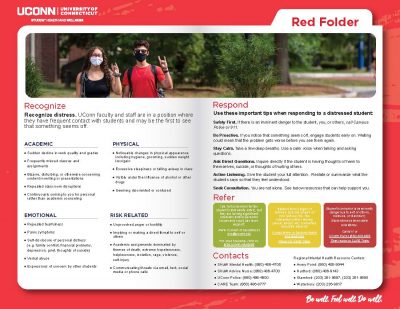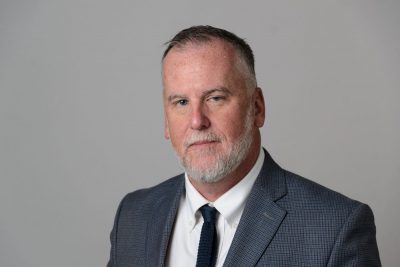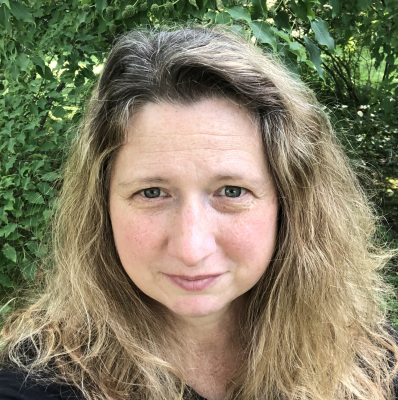Office of the Provost
Provost’s Office Monthly – October 2022
Welcome from the Interim Provost
We are officially past the midpoint of the fall semester, and things are in full swing. In the last newsletter, I mentioned that the Provost Office would be organizing and defining our current priorities. I’m pleased to share the 2022-2023 Provost Office Plan, which describes what initiatives we are prioritizing and how we’ve framed our thinking. Click here to view the full 2022-2023 Provost's Office Plan.
There are some major ongoing projects this year that require significant time and attention, like the implementation of the Interfolio Review, Promotion and Tenure module. This is a big undertaking, but will result in a more efficient and smoother process for PTR/PR review.
Another major project is the work happening around assessment of academic programs. It’s evident that we need to develop better understandings of outcomes and student learning objectives for our programs. This is not only to support student success, but to address needs of the university for our institutional accreditation.
We’re also working on some more specific and targeted projects, like documenting faculty leave guidelines and an updated faculty compensation policy. We’ll share more about all of these things as we make progress on each of our outlined initiatives for the year.
Of course, there may always be new things that come up throughout the year. I’ve learned to always expect the unexpected in the Provost Office, and we’ll be flexible as new initiatives arise.
All best,
![]()
Anne D'Alleva
Interim Provost & Executive Vice President for Academic Affairs
Academic Updates and Reminders
New Bulk Minor Curricular Action Request Form (TRUCK)
The University Senate Curricula and Courses Committee has approved an expedited process for numerous small course revisions in support of a unit’s curricular changes. The process involves using a form, Temporary Relief for Untying Curricular Knots: Bulk Minor Curricular Action Request Form (TRUCK), that is meant to provide temporary relief to the CAR system for bulk changes to a curriculum.
Please note the following:
- The TRUCK cannot be used to propose new courses, only course revisions;
- “Numerous” is defined here as 5 or more. If you are revising fewer than 5 courses, use the Curricular Action Request form for each course;
- “Small” is defined here as largely editorial or cosmetic changes that do NOT significantly change a course’s name, content, level, number of credits, or general education components. Any changes that fundamentally alter any of these five components of a course must use the traditional Curricular Action Request form;
- This is “temporary” since Courseleaf, a new curricular management system, will be implemented within the next two years by the Registrar’s Office. TRUCK will sunset when Courseleaf is officially fully implemented;
The TRUCK form has been developed with consultation from several bodies in the curricular process, and the Senate has been in close consultation with the Registrar’s Office about potential unintended consequences of using this process. Instructions, a letter of intent form, and the actual TRUCK form are available on the Senate website. Contact Karen McDermott (karen.mcdermott@uconn.edu) or Suzanne Wilson (suzanne.wilson@uconn.edu) with any questions.
Diversity, Equity, Inclusion & Justice Programming Opportunities
On November 9th and 10th, in partnership with the Humanities Institute, Office of Diversity & Inclusion, and CETL, the Office of the Provost will host a presentation by Dr. Marissa Greenberg, Associate Professor of English at the University of New Mexico focused on caucusing in the classroom as a justice-oriented pedagogy that centers students’ complex identities in their education experience.

Wednesday, November 9th, 2022
Presentation: “Leveraging Affinity and Alliance for Justice, Inclusion and Deep Learning” 3 – 4 p.m.
Humanities Institute Conference Room and livestream via WebEx
Most familiar from political organizing, caucusing in the classroom mobilizes affinities and builds alliances to foster deep learning for all students. Dr. Greenberg shares strategies and tactics for caucusing and describes her experience using this pedagogy to show how it makes interventions where they matter most
Thursday, November 10th, 2022
Workshops: “Making Room for Caucusing in your Classroom”
Faculty Session: 9:30 a.m. – 12 p.m.
Graduate Assistant Session: 2:00 p.m. – 4:30 p.m.
Humanities Institute Conference Room, space limited
In these workshops, Dr. Greenberg builds in her presentation on caucusing to guide faculty and graduate instructors through incorporating caucusing into their courses. She will address practical considerations, like learning objectives and time management, as well as emotional and professional risks associated with this pedagogy. Each instructor should bring the syllabus for a course that they are interested in revising to make room for caucusing. Participants from across all ranks and disciplines are welcome.
RSVP to the presentation and/or workshops here.
Pop-Up Classes
One new Pop-Up course, Exploring the Entrepreneurial Perspective, is running for 7 weeks during the 2nd half of the fall semester (Dates: Monday, October 17th through Friday, December 9th). We are also reoffering one of our most popular Pop-Up courses during this same time period, U.S. Anti-Black Racism.
New York Times Subscriptions for Storrs Undergraduate Students
Undergraduate Student Affairs (USG) has purchased a year-long subscription to the New York Times for all UConn Storrs Undergraduate students. For faculty who may assign any New York Times articles in your syllabus, please remind your students of this resource. Click here to view information on how students can access their subscription. https://usg.uconn.edu/academic-resources/
Interfolio Information Session
On November 15th, the Provost Office is holding a virtual information session to share an introductory presentation to the community on the use of the Interfolio Review, Promotion and Tenure (RPT) module, give an overview of the implementation plan, and address common questions we have been receiving. If you are in any way involved in PTR/PR, we strongly encourage you to attend. Details on the info session can be found here.
News & Updates
Husky Harvest
Access to affordable healthy food is a necessity for UConn students to succeed. Over the last few years, Senior Vice Provost Jeffrey Shoulson has been working with a task force to analyze and address food insecurity on our regional campuses. A crucial first step in addressing this issue is establishing food pantries on our Avery Point, Hartford and Waterbury campuses, and extending service at the food pantry operating on our Stamford campus. We are proud to share that we have partnered with Connecticut Foodshare to create Husky Harvest, with locations at each of our regional campuses for students to access meals on campus, and to bring home for themselves and their families. Husky Harvest locations on the regional campuses are expected to open in November.
Edward C. Marth Mentorship Award
The AAUP UConn Chapter established the Edward C. Marth Mentorship Award to recognize the leadership and dedication of Edward Marth, former Executive Director of the AAUP UConn Chapter, to both encourage and reward outstanding mentoring of graduate students by UConn Graduate Faculty members. Recipients of the award have had direct and significant impact and involvement with graduate students, outstanding commitment and effectiveness as a mentor of graduate students at UConn, and have demonstrated unusual effort to provide consistent mentoring of graduate students during the course of their careers. Recipients will be Graduate Faculty members who have extraordinary records of excellence and effectiveness in activities such as facilitating smooth transitions for both entering and exiting graduate students; showing sensitivity to students' academic, personal, and professional goals and needs; being accessible to students; playing an active role in coaching graduate students through the graduate school experience and connecting them to appropriate intellectual and professional networks; and, guiding graduate students toward intellectual and professional independence. Nominations are due November 21, 2022, and more information is available here.
Faculty Recognition Celebration Event
The Office of the President and Office of the Provost hosted the inaugural Faculty Recognition Celebration on Tuesday, October 18th to honor the achievements of faculty who have received national and international prestigious awards and recognitions from professional organizations and entities external to UConn. University Professor Dr. Cato Laurencin was the keynote speaker and shared insightful examples of excellence and leadership from his own career with those in attendance. Click here to view the database of prestigious awards and honors won by our faculty.
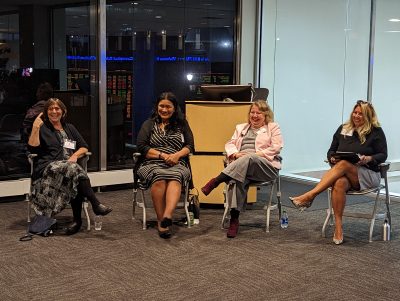
Women’s Leadership Forum Event
In partnership with the Women's Center, the Office of the Provost established the Women’s Leadership Forum which is a collective of UConn leaders who identify as women invested in the development and success of other women in leadership positions at UConn and UConn Health. Invitations are extended to leaders in managerial-level academic or administrative positions. The first event of the fall took place earlier this month and featured opportunities for networking and a panel discussion on “Sharing your Leadership Story: A Conversation with Women Leaders”, led by Fany Hannon, Michelle Williams and Kiki Nissen.
Dean of the School of Social Work Search
As many of you may know, Dean Nina Heller of the School of Social Work plans to step down from the deanship at the end of the 22-23 academic year. Dean Heller has served as dean for the past 7 years and has led the school through challenging times such as the covid-19 pandemic while continuing to foster life-transformative education for students. Under her leadership, the school implemented a Diversity, Equity, Inclusion and Anti-Racism (DEI/AR) Program, completed its strategic plan, has maintained its ranking as the #1 Social Work School in the state of Connecticut, and has moved the school to the top 12% nationally. The Office of the Provost will undertake a national search to identify candidates to lead the School of Social Work, to be chaired by Kent Holsinger, Vice Provost for Graduate Education and Dean of the Graduate School and Professor of Ecology and Evolutionary Biology.
Dean of the School of Nursing Search
A national search is underway to identify candidates to lead the School of Nursing following the planned retirement of Dean Deborah Chyun at the end of the 2022-23 academic year. This searched is chaired by Jason Irizarry, Dean of the Neag School of Education and Professor of Curriculum and Instruction. Listening sessions took place earlier this month and applications will be open in the coming weeks. Click here to learn more about the status of this national search.
Humanities Institute Director Search
The search for the next director of the Humanities Institute has kicked off and is being chaired by Jeffrey Ogbar, Professor of History and Director of the Center for the Study of Popular Music. The search will be conducted internally and the position is open for applications through November 10, 2022. Click here for more details including search committee membership, position description, and how to apply.
Highlighting Interdisciplinary Scholarship at UConn
Fostering collaborative and interdisciplinary scholarship and research is at the forefront of our mission as an R1 flagship University. There are intersecting ideas and synergies across departments, schools and colleges, and centers and institutes. Each month we plan to highlight a center or institute to share their message and raise awareness around their work. This month, we are spotlighting the Institute of the Environment.
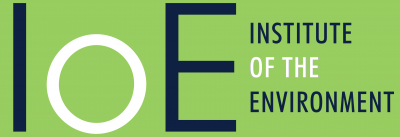 Established in 2019, the Institute of the Environment (IoE) has a mission to advance research, education, and engagement concerning the environment and sustainability. It is a broadly inclusive organization that comprises more than 150 faculty members and four administrative units: the Center for Environmental Sciences & Engineering, the Connecticut State Museum of Natural History, the Natural Resources Conservation Academy, and the Office of Sustainability. Programs of the IoE focus on issues regarding the environment and sustainability, and enhance synergy, collaboration, and cooperation across all facets of the University including the arts and humanities; biophysical, engineering, and social sciences; health and agriculture; and law and policy. IoE is dedicated enhancing diversity, equity, inclusion, and belonging in all endeavors and programming.
Established in 2019, the Institute of the Environment (IoE) has a mission to advance research, education, and engagement concerning the environment and sustainability. It is a broadly inclusive organization that comprises more than 150 faculty members and four administrative units: the Center for Environmental Sciences & Engineering, the Connecticut State Museum of Natural History, the Natural Resources Conservation Academy, and the Office of Sustainability. Programs of the IoE focus on issues regarding the environment and sustainability, and enhance synergy, collaboration, and cooperation across all facets of the University including the arts and humanities; biophysical, engineering, and social sciences; health and agriculture; and law and policy. IoE is dedicated enhancing diversity, equity, inclusion, and belonging in all endeavors and programming.
The IoE engages faculty members, staff members, and students to raise awareness and address some of the most pressing challenges that confront society in the 21st century. These challenges represent “wicked problems” that include climate change and biodiversity loss, air and water pollution, habitat loss and fragmentation, as well as energy and food security, to mention only a few. Each of these challenges is complex, intimately interwoven with human activities, and requires multidisciplinary collaboration to understand underlying causes of problems, and to develop comprehensive solutions that are effective and just, ultimately leading to sustainable systems that enhance human-wellbeing for all segments of society, including future generations.
The work of the IoE starts internally, through collaborations with the University’s operational units to ensure that our institutional commitments to sustainability and green infrastructure are essential values that guide decision-making. The Office of Sustainability (OS) leads, collaborates, advises, and advocates for sustainable goals and actions across the campuses of the University of Connecticut. The OS staff, Sustainability Interns, and EcoCaptains work with senior administrators, students, faculty and staff members to set and achieve strategic sustainability goals in the areas of climate action and resilience, energy and buildings, waste reduction and diversion, water resources, food and dining, grounds, purchasing, transportation, open space and natural resource stewardship, and the intersection of these issues with environmental and social justice. In addition, the OS develops outreach and engagement programs that use experiential learning to raise awareness and improve performance around sustainable practices and behaviors. As a consequence of leadership by the OS and the commitment and dedication of all components of the university, UConn has been nationally and internationally recognized for its performance with respect to sustainability and for being a green campus.
 The Center for Environmental Sciences and Engineering (CESE) engages in cutting-edge, interdisciplinary research to solve complex and emerging environmental challenges. CESE leads and catalyzes research involving its 12 core faculty members from departments within the College of Agriculture and Natural Resources, the School of Engineering, and the College of Liberal Arts and Sciences. In general, CESE supports multidisciplinary research that bridges the basic and applied sciences, and provides technical expertise and laboratory infrastructure in the areas of organics, nutrients, metals, and emerging or persistent contaminants (e.g., forever compounds [PFAS, per-and polyfluoroalkyl substances], harmful algal toxins, polychlorinated bisphenols [PCBs]). Activities supported by CESE strengthen the scientific understanding of complex and evolving natural systems, monitor environmental quality, inform sound stewardship, and enlighten policy. Taken together, such activities provide guidance for long-term sustainability.
The Center for Environmental Sciences and Engineering (CESE) engages in cutting-edge, interdisciplinary research to solve complex and emerging environmental challenges. CESE leads and catalyzes research involving its 12 core faculty members from departments within the College of Agriculture and Natural Resources, the School of Engineering, and the College of Liberal Arts and Sciences. In general, CESE supports multidisciplinary research that bridges the basic and applied sciences, and provides technical expertise and laboratory infrastructure in the areas of organics, nutrients, metals, and emerging or persistent contaminants (e.g., forever compounds [PFAS, per-and polyfluoroalkyl substances], harmful algal toxins, polychlorinated bisphenols [PCBs]). Activities supported by CESE strengthen the scientific understanding of complex and evolving natural systems, monitor environmental quality, inform sound stewardship, and enlighten policy. Taken together, such activities provide guidance for long-term sustainability.
The Connecticut State Museum of Natural History explores how natural history shapes the lives of people and how in turn, people shape the environment. Through public events and exhibits hosted at UConn and throughout Connecticut, the CSMNH shares UConn’s world-class scholarship directly with students and the public, striving to give new types of learning experiences to people of all ages, and to interpret the scholarship generated by faculty and staff members, as well as by students, in ways that make it relevant and useful to the lives of everyone. By engaging collaboratively across the many disciplines at the University, the CSMNH inspires creative and novel perspectives about the relationship of humans with the natural world. A new exhibit, “Right Below Your Feet, a Beautiful Evolutionary Success Story”, will open in the Wilbur Cross Building on Wednesday, October 26 at 3:00 PM. It features a group of organisms called bryophytes, about 20,000 species of mosses, liverworts, and hornworts, and highlights the evolutionary success of the group as well as its incredible beauty.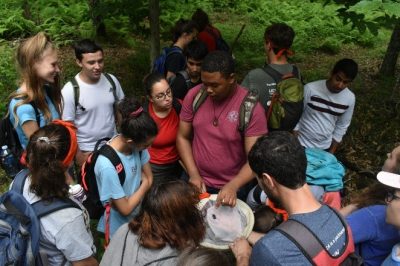
The Natural Resources Conservation Academy represents a consortium of scholars and educators from the College of Agriculture, Health, and Natural Resources, the College of Education, and the Center for Environmental Sciences and Engineering. The mission of the NRCA is to engage diverse teen and adult participants in natural resources conservation through place-based, experiential outdoor education, and to facilitate community action through collaborative partnerships that contribute to local environmental solutions. Signature programs include the Conservation Ambassador Program, Difference Maker Mentors Program, the Conservation Training Partnership, and the Teacher Professional Learning Initiative. It has had broad success in reaching 537 participants from 141 schools and 158 local organizations in 163 towns and producing 233 community projects.
Events and News
The IoE in collaboration with its constituent units have developed a number of exciting opportunities to engage faculty members, staff members, students, and the public this semester.
Environmental and Social Sustainability Small Grants (ESSSG).— The Office of Sustainability and the Institute of the Environment is funding a program to support student-faculty projects that enhance environmental sustainability and campus-wide engagement with sustainability issues at the University of Connecticut and in Connecticut communities through research, authentic community engagement, campus operations, or education. Projects must increase both environmental and social sustainability at UConn, and address one or more of UConn's strategic sustainability goal areas (climate change, energy and buildings, waste, outreach and engagement, water resources, food and dining, purchasing, transportation, or grounds, open space and conservation areas) and one or more related social challenges (fostering inclusion of diverse perspectives, addressing systematic inequalities, environmental justice, social and health inequity, community development, etc.). Project activities can occur at any of the UConn campuses or extend to Connecticut communities outside of the University campuses. Special consideration is given to interdisciplinary projects that advance equity and justice or incorporate the arts and humanities.
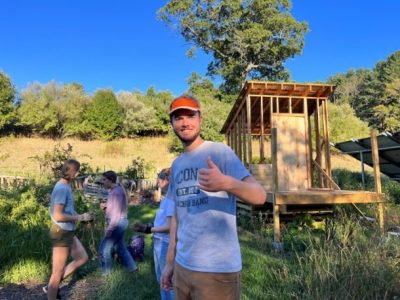 Mini-Grants in Support of Environmental Research (MiSER).—In collaboration with Institute of the Environment, the Center for Environmental Sciences and Engineering is conducting a Mini-Grant Competition to provide financial support for faculty members at UConn to enable a reductions in the cost of analyses conducted in CESE’s Environmental Chemistry Laboratories (i.e., analyses of nutrients, metals, and organics) that directly relate to one or more of the following objectives: (1) To support the development of new environmental proposals to state, federal, or private sector funding agencies; (2) To enhance environmental scholarship and outreach; (3) To enhance the quality of graduate student research; or (4) To enhance collaboration by environmental faculty members with CESE’s Environmental Chemistry Laboratories. The application deadline is October 29, 2022.
Mini-Grants in Support of Environmental Research (MiSER).—In collaboration with Institute of the Environment, the Center for Environmental Sciences and Engineering is conducting a Mini-Grant Competition to provide financial support for faculty members at UConn to enable a reductions in the cost of analyses conducted in CESE’s Environmental Chemistry Laboratories (i.e., analyses of nutrients, metals, and organics) that directly relate to one or more of the following objectives: (1) To support the development of new environmental proposals to state, federal, or private sector funding agencies; (2) To enhance environmental scholarship and outreach; (3) To enhance the quality of graduate student research; or (4) To enhance collaboration by environmental faculty members with CESE’s Environmental Chemistry Laboratories. The application deadline is October 29, 2022.
Multidisciplinary Environmental Research Awards for Graduate Students (MERAGS).—As part of its mission to enhance multidisciplinary scholarship, the Center for Environmental Sciences and Engineering, in collaboration with the Institute of the Environment, is funding projects to support multidisciplinary environmental research by graduate students. These awards provide support during the Spring and Summer Semesters to encourage multidisciplinary collaborative research and scholarship related to the environment by graduate students (either Master’s or Doctoral students) and faculty members at UConn. Proposed research or scholarship can include any disciplinary facet of the university (humanities, social sciences, biophysical sciences, engineering sciences, fine arts, law, etc.) with a focus on environmental issues. The application deadline is November 17, 2022.
The Living Building Philanthropic Initiative.—Join us on an exciting and innovative philanthropic journey to raise funds to construct a distinctive “Living Building” to house the Institute of the Environment, with ample exhibition and research space for the Connecticut State Museum of Natural History. Our proposed “Living Building” is purposefully designed to blur the perceived separation between humans and nature, and to enhance the sense that humans are part of the environment. Through creative architecture and design, living buildings enhance their surroundings by surpassing goals of environmental mitigation
by elevating building goals to embody environmental regeneration. Meeting a set of performance standards set forth by the International Living Future Institute, Living Building design, construction, and space-use “make the world a better place.”
Our living building will be “from the people of Connecticut for the people of Connecticut,” reflecting our shared environmental and cultural heritage. The building will act as a highly visible gateway for environmental programming involving research, education, and outreach that reflects the University’s commitment to sustainability and the environment. The elements that characterize Living Buildings are fully aligned with UConn’s core values of innovation, global engagement, diversity, and leadership. Indeed, the IoE Living Building is the perfect venue to showcase UConn’s status as a leading University: it will engage diverse communities across the state, create transformative experiences for students and lifelong learners, and generate new resources and knowledge through discovery. The first of its kind in the State of Connecticut, the building will be tangible evidence of the University’s commitment to advancing innovation and design.
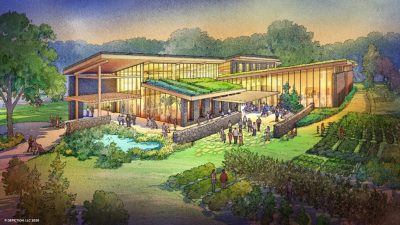
This unique building and its associated programming will advance the mission of the Connecticut State Museum of Natural History (CSMNH) and its associated Office of State Archaeology by highlighting Connecticut’s rich natural and cultural
heritage. It will be a destination for individuals of all ages from across the state and region, inspiring wonder and expanding appreciation of the natural world by providing visitors with truly life-changing opportunities to use our public spaces to intimately explore scientific specimens and exhibits.
By creatively combining state-of-the-art exhibit and education space with the sustainable characteristics that are inherent to Living Buildings, we will create an inspiring educational space for all that will help advance the missions of the Center for Environmental Sciences and Engineering, the Office of Sustainability, and the Natural Resources Conservation Academy, as well as to promote environmental sustainability and responsible stewardship of the natural world.
The Living Building will synergize interactions among IoE units and enhance collaborations among diverse faculty members, students, and environmental professionals in multidisciplinary scholarship and educational pursuits. The positive environmental impacts of a Living Building will provide an effective platform for reaching Connecticut communities by telling meaningful stories that resonate with visitors from across the state and nation. Indeed, the Living Building will act as a living laboratory to highlight sustainable practices (energy conservation, water recycling). Our collections and programming are designed to inspire the public by creating opportunities for compelling community engagement. By embedding exhibit and educational space within a beautiful, functional Living Building, we will enrich the experiences of visitors by engaging and inspiring them to think deeply about and care for the natural world. By creating a Living Building, the people of Connecticut will gain a special landmark that will function as a transformative space to experience, discover, and support the natural world.
Academic Affairs Spotlight
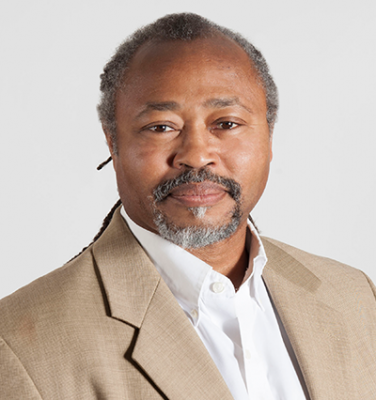
The Office of the Provost and the units that report in academic affairs are staffed and led by an outstanding group of talented and dedicated colleagues. This month we are spotlighting Michael Bradford, Vice Provost for Faculty, Staff, and Student Development.
Michael has served as vice provost at UConn since September, 2020. In this role, he oversees faculty recruitment, retention, and onboarding; faculty and academic staff development and recognition; faculty and academic staff equity and access; and student success and equity initiatives. Prior to this role,
Michael has held roles as department head of Dramatic Arts at UConn, artistic director of the Connecticut Repertory Theatre, and faculty director for the Schola2rs House Learning Community. Michael is professor of dramatic arts and teaches theatre history, dramatic literature, and playwriting, and his full-length and one-act plays have been featured both regionally and internationally.
What does a typical work week look like for you?
Except for my standing meetings with direct reports and other university stakeholders, it is hard to define what a work week looks like. There are issues that pop up and need to be addressed from speaking with students and their parents, to bias incidents in units across our campuses to responding to questions around academic policy. And then there are the programs and initiatives like the Husky Book Bundle, Faculty Leadership training, which is a new initiative, that I need to plan and implement. And then there is the Life Transformative Education initiative.
What is an important project/initiative you’re working on right now?
I would say the many projects associated with LTE, planning a series of conversations with academic program assistants in the spring, and the Second Book Project for Associate Professors that we are planning for this spring are just three initiatives I am working closely with our Project Coordinator Nisha Hardnett that I am deeply excited about.
What are you most looking forward to as the academic year progresses?
I am always excited about moving the needle supporting student's academic success, supporting faculty retention, and staff professional development. And honestly, I simply get geeked up when students arrive back on campus in the fall.
If you could solve one problem right now at UConn, what would it be?
That every person on this campus feels valued and appreciated, feels seen and heard.
What is your favorite UConn moment?
This year we had a great time working with Nisha Hardnett and the Transfer Student Organization to put together a welcome event for transfer and campus change students. Over 140 students and of course the ice cream was on point!
Important Dates, Deadlines & Events
November 8, 2022 – Election Day
November 9&10, 2022 - Caucusing in the Classroom events with Marissa Greenberg
November 11, 2022 – Veteran’s Day
November 15, 2022 – Interfolio Information Session (Click here for details)
November 21, 2022 – Nominations for Edward C. Marth Mentorship Award Due
November 24, 2022 – Thanksgiving Day
Provost Office Awards
The Provost Office facilitates the following awards: Board of Trustees Distinguished Professor Award, Provost’s Outstanding Service Award, Provost’s Award for Excellence in Community Engaged Scholarship, and Alumni Faculty Excellence Awards.
Nominations for these awards are now open. Visit our website for details on nomination materials, deadlines, and past winners.
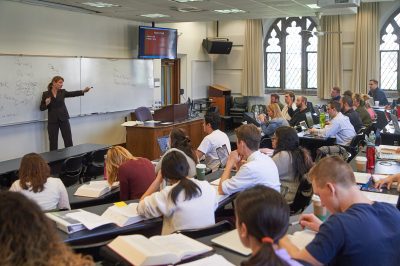
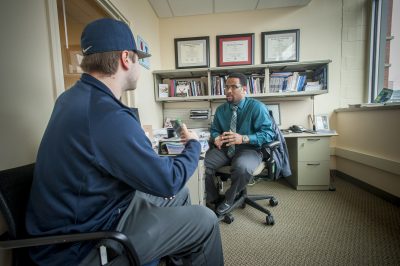
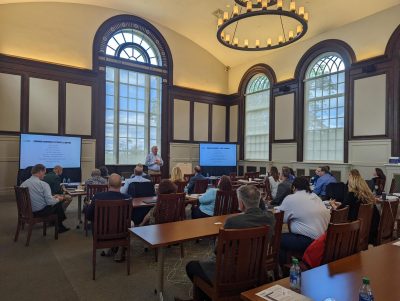
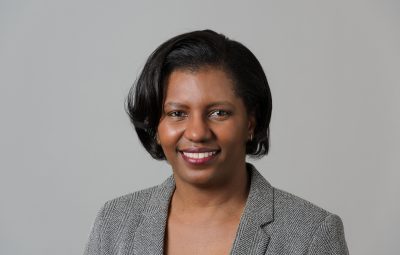
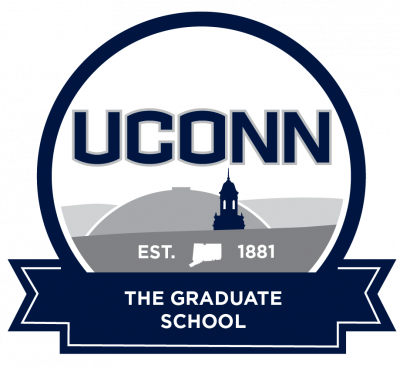
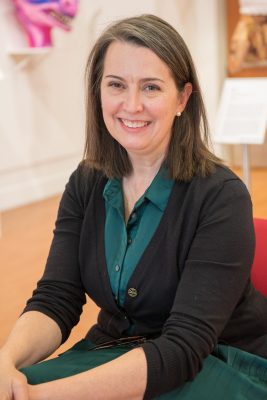
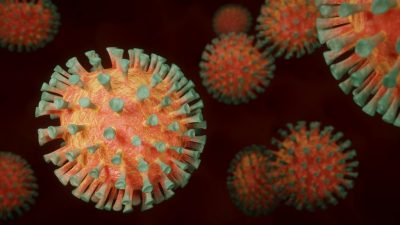 Over the past two years, we have faced numerous challenges due to the COVID-19 pandemic, but UConn’s faculty, staff, students, and community partners have shown incredible teamwork, resilience, and commitment to health and safety, that has carried us through to this point. This year, more than 91% of classes are scheduled to be held in-person, including undergraduate and graduate courses, lectures, discussions, labs, seminars, and hybrid courses on all our campuses. We have also learned how to effectively offer online learning opportunities and continue to offer online modalities when based on sound pedagogy and in the interest of academic programming. While we are all excited to return to campus this fall, it’s important to remember our campus safety guidelines, and to know the resources available to you as we foster the UConn experience for our students.
Over the past two years, we have faced numerous challenges due to the COVID-19 pandemic, but UConn’s faculty, staff, students, and community partners have shown incredible teamwork, resilience, and commitment to health and safety, that has carried us through to this point. This year, more than 91% of classes are scheduled to be held in-person, including undergraduate and graduate courses, lectures, discussions, labs, seminars, and hybrid courses on all our campuses. We have also learned how to effectively offer online learning opportunities and continue to offer online modalities when based on sound pedagogy and in the interest of academic programming. While we are all excited to return to campus this fall, it’s important to remember our campus safety guidelines, and to know the resources available to you as we foster the UConn experience for our students.
